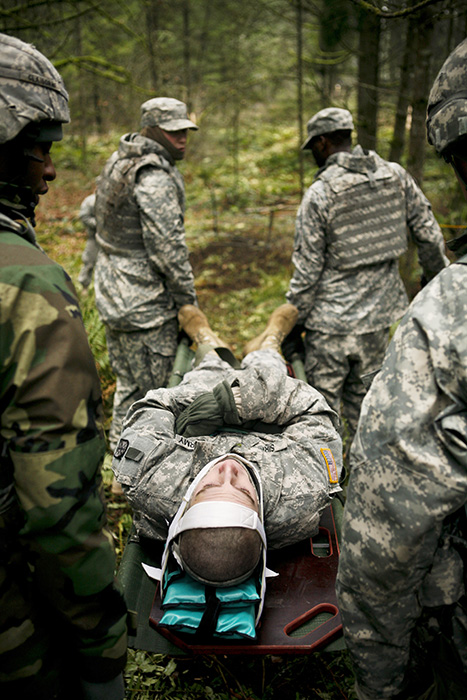Army Funding Development of Battlefield Devices to Assess Moderate, Severe Brain Injury
The U.S. Army Medical Research and Materiel Command awarded two contracts totaling more than $12 million for the advanced development of two medical devices to aid in battlefield triage and treatment of wounded Service Members suspected of moderate to severe traumatic brain injury.
Neural Analytics, under contract number W81XWH-17-C-0245, will further develop its portable Lucid™ System, which is designed to evaluate cerebral blood flow in patients with brain injuries. The contractor will modify the existing technology to better suit military environments and to operate in prolonged field care scenarios. Battelle, headquartered in Columbus, Ohio, will provide Neural Analytics with technical and advanced engineering expertise to help ruggedize and miniaturize the device so it meets military requirements. Additionally, Infrascan, under contract number W81XWH-17-C-0244, will further develop its Infrascanner Model 2000, a light-weight, handheld device designed to detect intracranial hematomas, or bleeding in the brain, using near infrared technology.
Both devices are expected to be portable systems that can measure and monitor for at least 72 hours, on both conscious and unconscious patients. The devices will also require minimal user training and maintenance.
"The goal is to provide combat medics and first responders with hand held, ruggedized, cutting-edge medical tools to assist with triage and treatment decisions during prolonged care of injured Service Members suspected of sustaining a moderate or severe traumatic brain injury at the point of injury," said Brian Dacanay, a product manager at the U.S. Army Medical Materiel Agency.
Both contracts will be managed by USAMMA, a subordinate organization of USAMRMC. As the advanced developer, USAMMA is working in collaboration with USAMRMC's Combat Casualty Care Research Program, which provided funding for the project via the program's Congressional Special Interest budget allotment. As part of the Department of Defense's Neurotrauma Program, the team is focused on closing critical military gaps that include triage, stabilization and treatment of brain injury. Priorities include mitigation and prevention of secondary brain injury in more severely injured patients in the pre-hospital setting.
From 2000 to 2016, more than 360,000 Service Members sustained brain injuries, according to the Defense and Veterans Brain Injury Center. The DOD has made early, appropriate intervention of brain injury a top research priority, both to reduce battlefield deaths and improve care outcomes for injured Service Members.
"In 2016, data indicated that approximately one Warfighter sustained a moderate or severe brain injury for every five casualties on the battlefield," said Dacanay. "Early intervention is essential because of irreversible medical complications that may ensue due to the severity of brain injury. The technologies awarded for further development have the potential to save lives and improve future quality of life for these injured Warfighters."
 An official website of the United States government
An official website of the United States government
 ) or https:// means you've safely connected to the .mil website. Share sensitive information only on official, secure websites.
) or https:// means you've safely connected to the .mil website. Share sensitive information only on official, secure websites.



